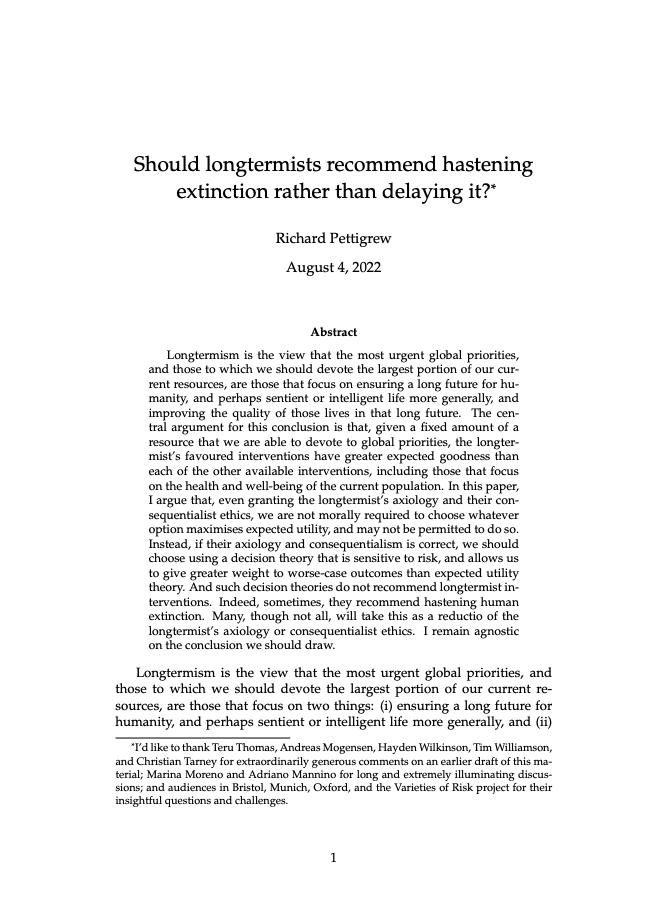Should longtermists recommend hastening extinction rather than delaying it?
Richard Pettigrew (University of Bristol)
GPI Working Paper No. 2-2022, forthcoming at The Monist
Longtermism is the view that the most urgent global priorities, and those to which we should devote the largest portion of our current resources, are those that focus on ensuring a long future for humanity, and perhaps sentient or intelligent life more generally, and improving the quality of those lives in that long future. The central argument for this conclusion is that, given a fixed amount of a resource that we are able to devote to global priorities, the longtermist’s favoured interventions have greater expected goodness than each of the other available interventions, including those that focus on the health and well-being of the current population. In this paper, I argue that, even granting the longtermist’s axiology and their consequentialist ethics, we are not morally required to choose whatever option maximises expected utility, and may not be permitted to do so. Instead, if their axiology and consequentialism is correct, we should choose using a decision theory that is sensitive to risk, and allows us to give greater weight to worse-case outcomes than expected utility theory. And such decision theories do not recommend longtermist interventions. Indeed, sometimes, they recommend hastening human extinction. Many, though not all, will take this as a reductio of the longtermist’s axiology or consequentialist ethics. I remain agnostic on the conclusion we should draw.
Other working papers
A Fission Problem for Person-Affecting Views – Elliott Thornley (Global Priorities Institute, University of Oxford)
On person-affecting views in population ethics, the moral import of a person’s welfare depends on that person’s temporal or modal status. These views typically imply that – all else equal – we’re never required to create extra people, or to act in ways that increase the probability of extra people coming into existence. In this paper, I use Parfit-style fission cases to construct a dilemma for person-affecting views: either they forfeit their seeming-advantages and face fission analogues…
Meaning, medicine and merit – Andreas Mogensen (Global Priorities Institute, Oxford University)
Given the inevitability of scarcity, should public institutions ration healthcare resources so as to prioritize those who contribute more to society? Intuitively, we may feel that this would be somehow inegalitarian. I argue that the egalitarian objection to prioritizing treatment on the basis of patients’ usefulness to others is best thought…
In Defence of Moderation – Jacob Barrett (Vanderbilt University)
A decision theory is fanatical if it says that, for any sure thing of getting some finite amount of value, it would always be better to almost certainly get nothing while having some tiny probability (no matter how small) of getting sufficiently more finite value. Fanaticism is extremely counterintuitive; common sense requires a more moderate view. However, a recent slew of arguments purport to vindicate it, claiming that moderate alternatives to fanaticism are sometimes similarly counterintuitive, face a powerful continuum argument…

